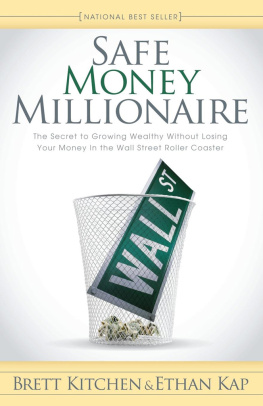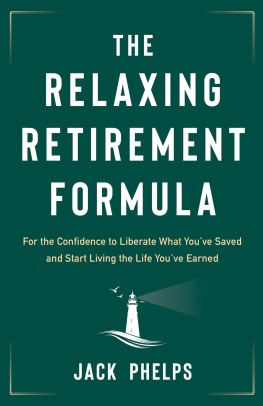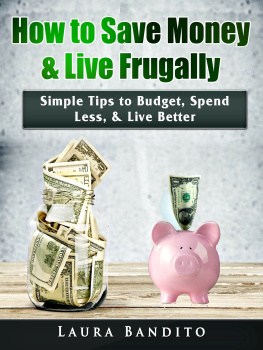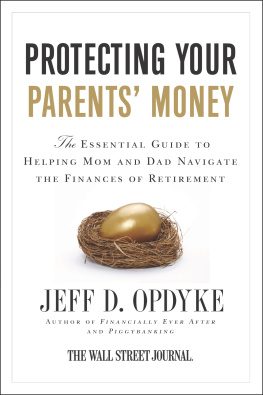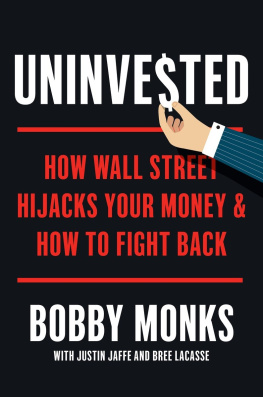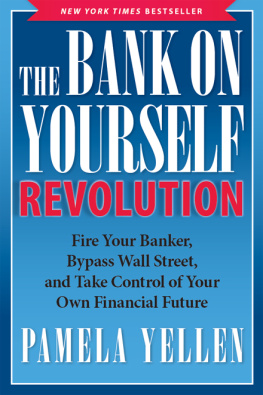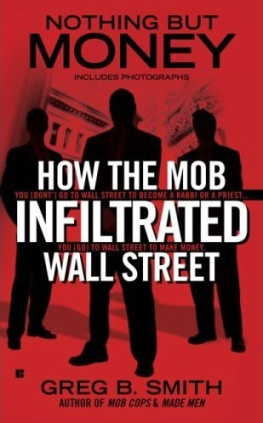Joanna Masel - Bypass Wall Street: A Biologist’s Guide to the Rat Race
Here you can read online Joanna Masel - Bypass Wall Street: A Biologist’s Guide to the Rat Race full text of the book (entire story) in english for free. Download pdf and epub, get meaning, cover and reviews about this ebook. year: 2016, publisher: Perforce Publishing LLC, genre: Romance novel. Description of the work, (preface) as well as reviews are available. Best literature library LitArk.com created for fans of good reading and offers a wide selection of genres:
Romance novel
Science fiction
Adventure
Detective
Science
History
Home and family
Prose
Art
Politics
Computer
Non-fiction
Religion
Business
Children
Humor
Choose a favorite category and find really read worthwhile books. Enjoy immersion in the world of imagination, feel the emotions of the characters or learn something new for yourself, make an fascinating discovery.

- Book:Bypass Wall Street: A Biologist’s Guide to the Rat Race
- Author:
- Publisher:Perforce Publishing LLC
- Genre:
- Year:2016
- Rating:3 / 5
- Favourites:Add to favourites
- Your mark:
- 60
- 1
- 2
- 3
- 4
- 5
Bypass Wall Street: A Biologist’s Guide to the Rat Race: summary, description and annotation
We offer to read an annotation, description, summary or preface (depends on what the author of the book "Bypass Wall Street: A Biologist’s Guide to the Rat Race" wrote himself). If you haven't found the necessary information about the book — write in the comments, we will try to find it.
Joanna Masel: author's other books
Who wrote Bypass Wall Street: A Biologist’s Guide to the Rat Race? Find out the surname, the name of the author of the book and a list of all author's works by series.
Bypass Wall Street: A Biologist’s Guide to the Rat Race — read online for free the complete book (whole text) full work
Below is the text of the book, divided by pages. System saving the place of the last page read, allows you to conveniently read the book "Bypass Wall Street: A Biologist’s Guide to the Rat Race" online for free, without having to search again every time where you left off. Put a bookmark, and you can go to the page where you finished reading at any time.
Font size:
Interval:
Bookmark:
A BIOLOGISTS GUIDE
TO THE RAT RACE

JOANNA MASEL
Copyrighted Material
Bypass Wall Street: A Biologists Guide to the Rat Race
Copyright 2016 by Perforce Publishing, LLC
All Rights Reserved.
No part of this publication may be reproduced, stored in a retrieval system or transmitted, in any form or by any means electronic, mechanical, photocopying, recording or otherwise without prior written permission from the publisher, except for the inclusion of brief quotations in a review.
For information about this title or to order other books and/or electronic media, contact the publisher:
Perforce Publishing, LLC
ISBNs:
978-0-9970100-1-5 paperback
978-0-9970100-2-2 ebook
Cover and Interior design: 1106 Design
Photo by Steven Meckler
To my father
CONTENTS


PREFACE

Why did I, an evolutionary biologist, write a book about economics and investing? It seems quite a jump, and many people are understandably surprised and skeptical. But interestingly, none of those skeptics are economists or evolutionary biologists. These two are actually sister disciplines, closer than people think. Both study competition, and both study how individuals hedge their bets in an uncertain world. Both study the flow of information, and how individuals try to manipulate those flows. Both study what happens in the past, while struggling to perform experiments in the present. Because many important questions cannot be addressed directly by experiments, both often rely on mathematical models instead. But dont worry; you dont need to know any math to read this book.
I was busy doing biology research, starting on a new project, when parallels between that project and economics jumped out at me. The implications of these parallels were too important to ignore. With a sabbatical coming up, I postponed my biology research, made a big career leap, and started writing this book.
That biology project was and is about the difference between relative and absolute competitions in evolution. To see the difference, think about a running race. An absolute competition pits each runner against the clock. Anyone who finishes the race in less than a certain time is allowed to have children. Those with stumpy legs and flat feet eventually die out, and are replaced by the children of the fast runners. So in the next generation, the average person runs faster.
In a relative competition, competitors race in pairs against one another instead of against the clock. In this cutthroat contest, there are no rules. One competitor is super fast. Unfortunately, he gets tackled from behind. In the ensuing brawl, he receives a solid blow to the head and passes out. The slower guy then wins. In each generation, the competition gets tougher, but not necessarily because the new generation runs faster. Strictly speaking, this relative competition does not favor being fast. What it favors is crossing the finish line before your competitor. Running fast is one way of crossing the finish line first. But evolution is a creative process, and there are many different ways of achieving the same goal. It is hard to predict which of the many solutions will triumph, and not all of the solutions are ones that we like.
Theres an old joke about this. Two men are hiking in the woods, and come across a bear, which lunges after them. One man takes out a pair of running shoes. What are you doing? says the other, Dont you know that bears can run thirty miles per hour? There is no way you can outrun it! I dont need to outrun the bear, replies the man, slipping on his second shoe, I only need to outrun you.
Many people want to get ahead in life. The question is, what sort of race are they running? In particular, is saving for retirement like running an orderly race against a clock, where everybody can improve their time? Or is the single most important thing about retirement saving simply to do better than the competition?
Most biological competitions are relative. Imagine a mutation that makes a tree produce twice as many seeds. There are already far more seeds than there are places for them to grow into trees. Finding a good spot to grow is like winning the lottery. More seeds means more lottery tickets, and so mutant trees win the lottery more often, become more common, and take over the forest. Now there are twice as many seeds, but each seed is only half as likely to win the lottery and grow into a new tree. The forest as a whole is no better off; it has no more trees than it did before. Nor is the average mutant tree in the mutant forest any better off than the average non-mutant tree in the pre-mutation forest. But in either forest, any individual tree is always better off having the mutation and producing more seeds.
The mutation is good is a true statement at the level of the individual, because producing twice as many seeds makes a tree into an effective competitor. But the mutation is good is not true at the level of the group. If a mutation were to let trees colonize toxic soil where nothing could formerly grow, then evolution by natural selection would make the group better off as a whole. But in the more usual case of a relative competition for fixed real estate, nothing improves for the group.
Relative competitions can even make things worse for the group. Producing twice as many seeds probably doesnt come for free. Lets assume instead that the extra seeds cost energy, and so a typical mutant tree needs a slightly bigger patch of soil and sunlight to survive. Producing twice as many seeds helps the plant a lot, while needing slightly more space hurts it a bit. Putting the two together, the mutant does better than the original, and will take over. But after it wins, there will be fewer trees than there were before.
My research project studies how arms race competitions that occur on a relative scale can interfere with competitions that play out on an absolute scale. In the process of doing it, I became attuned to thinking carefully about whether statements were true at the level of individuals or at the level of groups. Once attuned, I heard discordant statements everywhere. In particular, policy makers are keen to encourage people to save more money for retirement. This is great advice for individuals; the more money an individual saves, the more comfortable their retirement. But is it also a good idea for society as a whole? What happens when everybody tries to save money at the same time? After all, you cant eat money. Is all the extra money being invested in things that will make peoples retirements more comfortable? Or are all the savers in a relative competition, an arms race to stake a claim to a larger share of societys relatively inflexible amount of wealth?
Each tree also saves its energy and invests those savings in seeds to provide for its genetic future. The more a tree saves and invests, the better its future. But the more the forest saves and invests, the worse its future. Biology may have something to teach us here.
These distinctions between relative and absolute competitions, and between the good of each individual and the good of the group, apply to both biology and economics. Absolute competitions bring us absolute increases in prosperity in economics, while in biology they bring an absolute increase in the total amount of living things on the planet. Over the course of both biological and economic history, we began with very little and have a lot more now. In contrast, relative competitions, in both fields, bring us ornaments and arms races rather than true advances.
Next pageFont size:
Interval:
Bookmark:
Similar books «Bypass Wall Street: A Biologist’s Guide to the Rat Race»
Look at similar books to Bypass Wall Street: A Biologist’s Guide to the Rat Race. We have selected literature similar in name and meaning in the hope of providing readers with more options to find new, interesting, not yet read works.
Discussion, reviews of the book Bypass Wall Street: A Biologist’s Guide to the Rat Race and just readers' own opinions. Leave your comments, write what you think about the work, its meaning or the main characters. Specify what exactly you liked and what you didn't like, and why you think so.

